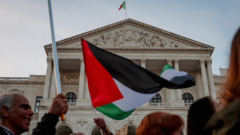Will Portugal's Recognition of a Palestinian State Shift Global Dynamics?

Published: 2025-09-20 07:55:26 | Category: technology
Portugal's decision to recognise a Palestinian state represents a significant shift in Western diplomatic policy as the ongoing conflict in Gaza escalates. This move, announced ahead of the United Nations General Assembly (UNGA), showcases a growing trend among Western nations to reassess their stance on Palestine amid intensified violence.
Last updated: 24 October 2023 (BST)
Key Takeaways
- Portugal will officially recognise a Palestinian state on Sunday.
- Several Western nations, including France, the UK, Canada, and Australia, are expected to follow suit.
- Israel has condemned this decision, arguing it rewards terrorism.
- The recognition of Palestine is gaining traction, with about 75% of UN member states already acknowledging it.
- Violence in Gaza continues, with significant casualties reported on both sides.
Background: The Israel-Palestine Conflict
The Israel-Palestine conflict has deep historical roots, stemming from territorial disputes and national identity issues. The situation intensified dramatically after Hamas's attack on Israel on 7 October 2023, which resulted in significant casualties. In retaliation, Israel launched extensive military operations in Gaza, leading to a humanitarian crisis.
Portugal's Recognition of Palestine
On Sunday, Portugal will become the latest Western nation to formally recognise a Palestinian state. This announcement was made by the Portuguese foreign ministry in anticipation of the upcoming UN General Assembly in New York. The move signals a potential shift in foreign policy among Western nations regarding the ongoing conflict in Gaza.
International Reactions and Implications
Israel has reacted strongly to Portugal's announcement. Prime Minister Benjamin Netanyahu stated that such recognition "rewards terror", referring to the recent attacks by Hamas. This sentiment has been echoed by the United States, Israel's key ally, with President Donald Trump expressing disagreement with the recognition during his recent visit to the UK alongside Prime Minister Sir Keir Starmer.
As the world prepares for the UNGA, which is expected to address the Israel-Palestine conflict, more nations appear poised to make similar announcements. France, the UK, Canada, and Australia are reportedly considering recognising Palestine, reflecting a significant shift in diplomatic attitudes.
The Current Situation in Gaza
The conflict has escalated dramatically, with Israeli military operations continuing in Gaza City. Reports indicate that Israeli tanks and troops are advancing, leading to a humanitarian crisis as thousands of residents flee the violence. The ongoing military campaign was initiated in response to the Hamas-led attack that killed approximately 1,200 people in Israel and resulted in numerous kidnappings.
Casualties and Humanitarian Impact
According to the Gaza Health Ministry, the toll of the conflict has been devastating. Since the beginning of the Israeli offensive, at least 65,141 Palestinians have reportedly been killed. The scale of these casualties highlights the severe humanitarian implications of the conflict, raising urgent questions about the need for international intervention and support for those affected.
UN General Assembly and Global Response
The upcoming UNGA is expected to be a pivotal moment as world leaders gather to discuss the ongoing crisis. With a significant portion of UN member states already recognising a Palestinian state, the potential shift in policy from Western nations could reshape diplomatic relations in the Middle East. The UN's role in mediating the conflict will be scrutinised, especially in light of increasing calls for humanitarian aid and ceasefires.
The Role of the United Nations
The United Nations has long been involved in efforts to mediate the Israel-Palestine conflict, advocating for a two-state solution. The recognition of Palestine as a non-member observer state in 2012 marked a significant step in this direction. As the situation unfolds, the UN's response and the actions of its member states will be crucial in addressing the humanitarian crisis and promoting peace in the region.
What Happens Next?
As Portugal and potentially other Western nations announce their recognition of Palestine, the international community will be watching closely. The implications of these decisions may lead to increased diplomatic tensions between Israel and these nations, as well as within the broader geopolitical landscape. The future of the Israel-Palestine conflict remains uncertain, with the potential for both escalated violence and renewed diplomatic efforts.
The recognition of a Palestinian state by Western nations is not only a significant political development but also a reflection of changing public sentiment regarding the Israel-Palestine conflict. As the humanitarian situation in Gaza deteriorates, the need for international intervention and support becomes increasingly urgent. What role will the global community play in addressing this crisis, and can a lasting peace be achieved amid such turmoil?
FAQs
Why is Portugal recognising Palestine now?
Portugal's recognition of Palestine comes amidst escalating violence in Gaza and reflects a broader shift in Western diplomatic policies regarding the Israel-Palestine conflict, particularly ahead of the UN General Assembly.
What are the implications of recognising a Palestinian state?
Recognising a Palestinian state could strain relations with Israel and influence international diplomacy, potentially impacting peace negotiations and humanitarian efforts in the region.
How many countries recognise Palestine?
Approximately 75% of the 193 UN member states already recognise Palestine, highlighting a significant level of international support for Palestinian statehood.
What is the current situation in Gaza?
The situation in Gaza is dire, with ongoing military operations resulting in significant casualties and a humanitarian crisis. Thousands have been displaced as violence continues to escalate.
What role does the United Nations play in the conflict?
The UN mediates the Israel-Palestine conflict, advocating for peace and humanitarian aid. It has previously granted Palestine non-member observer state status, facilitating its recognition by many countries.


